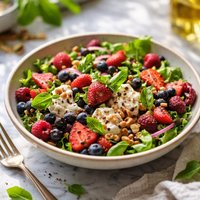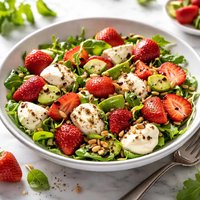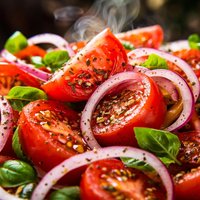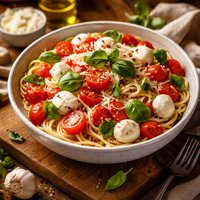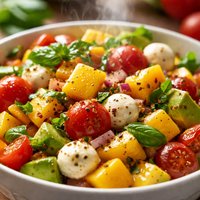Italian Peach Salad
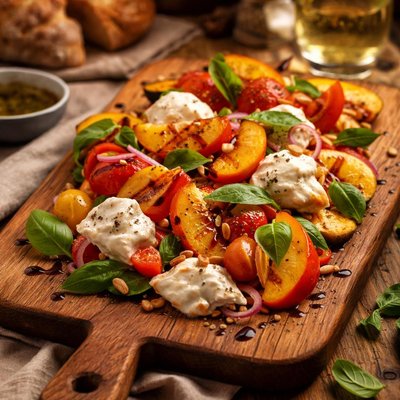
Celebrate the flavors of summer with this vibrant Italian Peach Salad, a refreshing and elegant dish that perfectly balances sweet, savory, and tangy notes. Juicy ripe peaches pair harmoniously with creamy fresh mozzarella, while delicate slices of prosciutto add a touch of salty decadence. A bed of peppery arugula provides a crisp, earthy base, all brought together with a drizzle of rich balsamic glaze and extra-virgin olive oil for the ultimate burst of Mediterranean flavor. Fresh basil leaves add an aromatic finish, making this no-cook recipe a quick yet impressive appetizer or side dish. Ready in just 15 minutes, this salad is a stunning addition to any summer table. Perfect for entertaining or as a light, satisfying meal, it's a must-try for lovers of seasonal produce and bold Italian flavors.
Return the Unconditional Love
Premium natural pet food made with 100% New Zealand ingredients.
Wholesome nutrition for your furry family

Recipe Information
Ingredients
- 3 whole ripe peaches
- 8 oz fresh mozzarella balls (bocconcini)
- 4 slices prosciutto
- 4 cups arugula
- 2 tbsp balsamic glaze
- 2 tbsp extra-virgin olive oil
- 10 leaves fresh basil leaves
- 0.5 tsp salt
- 0.25 tsp ground black pepper
Instructions
Wash and dry the peaches thoroughly, then slice them into thin wedges. Discard the pit.
Drain the fresh mozzarella balls and pat them dry using a paper towel. If they are large, cut them into bite-sized pieces.
On a large serving platter or individual plates, create a base layer of arugula leaves.
Arrange the peach slices and mozzarella pieces over the arugula, distributing them evenly.
Tear the prosciutto slices into smaller pieces and scatter them across the salad.
Drizzle the balsamic glaze and extra-virgin olive oil evenly over the salad for flavor and shine.
Garnish the salad with fresh basil leaves, torn slightly for aroma, if desired.
Season with salt and freshly ground black pepper to taste.
Serve immediately as a light appetizer or side dish. Enjoy!
Nutrition Facts
Calories |
299 | ||
|---|---|---|---|
% Daily Value* |
|||
| Total Fat | 19.0 g | 24% | |
| Saturated Fat | 7.5 g | 37% | |
| Polyunsaturated Fat | 0.2 g | ||
| Cholesterol | 39 mg | 13% | |
| Sodium | 541 mg | 24% | |
| Total Carbohydrate | 19.2 g | 7% | |
| Dietary Fiber | 2.2 g | 8% | |
| Total Sugars | 15.7 g | ||
| Protein | 14.6 g | 29% | |
| Vitamin D | 0.0 mcg | 0% | |
| Calcium | 254 mg | 20% | |
| Iron | 1.1 mg | 6% | |
| Potassium | 400 mg | 9% | |
*The % Daily Value tells you how much a nutrient in a serving of food contributes to a daily diet. 2,000 calories a day is used for general nutrition advice.

